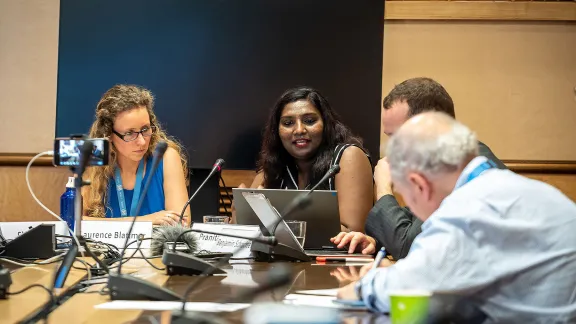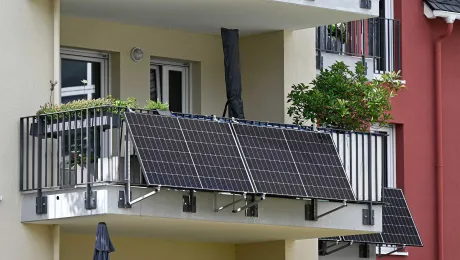
LWF Youth secretary Ms Pranita Biswasi, addressing the side-event on a human rightsâ perspective in climate action processes at the UN Office in Geneva. Photo: LWF/F. Wilches
LWF Youth secretary says climate change disproportionately impacts women, youth, indigenous communities
(LWI) – Meaningful climate policies and action must address the human rights perspective of the disproportionate impact of climate change on women, youth, minority groups and indigenous communities. This was a key recommendation from The Lutheran World Federation (LWF), other faith-based and civil society organizations co-hosting a side-event at the ongoing 41st session of the United Nations (UN) Human Rights Council in Geneva.
Panelists at the 28 June side-event included LWF Youth secretary Ms Pranita Biswasi. She emphasized LWF’s faith commitment to care for God’s creation and “to always include an intergenerational approach, bearing in mind that action or inaction today will impact future generations.”
The panel discussion coincided with the release of an analytical study by the Office of the UN High Commissioner for Human Rights on a gender-responsive climate action for the full and effective enjoyment of women’s human rights. It is a critical time in the Paris Agreement implementation schedule as 2020 is the deadline for States to submit new or updated agreements indicating commitment to reduce global warming or their Nationally Determined Contributions (NDCs).
“As countries finalize the adoption of the effective implementation of the Paris Agreement, meaningful climate action should be designed with the inclusion of young people and women and implemented as gender and generational responsive. It must also promote human rights, justice for marginalized communities and respect the well-being of other species,” Biswasi said.
Meaningful climate action should be designed with the inclusion of young people and women and implemented as gender and generational responsive.
“We are reminded of our interdependence and our common humanity. One country, one person, one gender or one generation alone cannot protect and avoid the dangerous impacts of climate change,” she added.
Biswasi also spoke of the adverse impact of prolonged droughts, cyclones and flooding on rural farmers. She noted that climate change directly impedes the “enjoyment of human rights including the right to life, adequate food and housing, safe drinking water and sanitation, self-determination and development.”
The LWF Youth secretary elaborated on the link between gender justice and climate change, saying that climate disasters aggravate the existing inequalities in society. She emphasized that wherever gender intersects with other categories such as ethnicity, poverty and disabilities, women and girls often find themselves disproportionately affected.
In a report on “Minority and Indigenous Trends 2019,” Mr Glenn Payot of the Minority Right Group International highlighted how minority groups and indigenous people “are already living” with consequences of climate change through rising sea levels, higher temperatures and extreme weather events such as frequent storms.
He called for mainstreaming of the rights of minority and indigenous communities into national and international climate change strategies, establishment of mechanisms to enable such groups to participate meaningfully in the different levels of policy negotiations, and recognition of their role as custodians of traditional knowledge.


